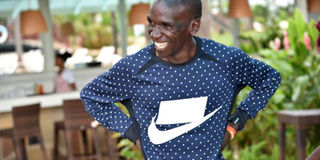Eliud Kipchoge: Breaking two-hour barrier still possible

Olympic marathon champion Eliud Kipchoge (left) during an interview with Nation Sport at Whitesands Beach Resort ahead of the Safaricom Sports Personality of the Year Award (Soya) Gala which was held at the Fort Jesus in Mombasa on January 11, 2019. PHOTO | KEVIN ODIT |
What you need to know:
- In 1967, the now 76-year-old ran a then world record two hours, nine minutes and 37 seconds at the Fukuoka Marathon in Japan, a time he improved to 2:08:34 in Antwerp, Belgium, four years later.
Last week, Australian Derek Clayton, a former two-time world marathon record holder, maintained that breaking the two-hour barrier over the 42-kilometre distance is still not less than 10 years away.
In 1967, the now 76-year-old ran a then world record two hours, nine minutes and 37 seconds at the Fukuoka Marathon in Japan, a time he improved to 2:08:34 in Antwerp, Belgium, four years later.
“I have been forecasting the year 2030 for the past 20 years and so far it seems I’m still on course,” he argued.
Clayton added that Kenya’s current world marathon record holder Eliud Kipchoge could possibly slice 10 or 20 seconds off his current world record time of 2:01:39 set in Berlin last year.
But he still holds a sub 2:00:00 is still a bit far, with Kipchoge, 34, begging to differ.
The Kenyan Olympic champion believes it’s a matter of focus and the iconic barrier will be broken.
Almost two years ago, running a bespoke, Nike-orchestrated, non-world record compliant race at the Monza Formula One circuit, Kipchoge ran 2:00:25, just 26 seconds outside the target.
The attempt, dubbed “Breaking2”, drove him into believing the barrier will fall sooner rather than later.
“It’s possible for a human being to run under two hours,” he told Nation Sport in Mombasa on Friday.
“With the right training, the right environment and the right people, and with the right thinking, then all is possible.
“But what sums it all is the belief,” the freshly-crowned 2018 Kenya Sports Personality of the Year added.
“If someone wants to run this unthinkable time, and he has no belief in his mind, then he cannot do anything. But if your belief is in the mind and in the blood, beyond the skin and into the bone marrow, then its possible.”
Kipchoge says the Monza experiment offered him great hope going into his successful world record attempt in Berlin last year where he sliced over one minute off compatriot Dennis Kimetto’s previous mark of 2:02:57 set on the same course in 2014.
“It gave me the confidence that I can run faster than any normal world record,” he explained.
“If I could run two hours and 25 seconds (in Monza), then what is two hours, two minutes and 57 seconds?
“I gained huge confidence and this helped me get the record.”
His fans are now waiting to see what the 2019 season holds for the greatest marathoner of all time!





